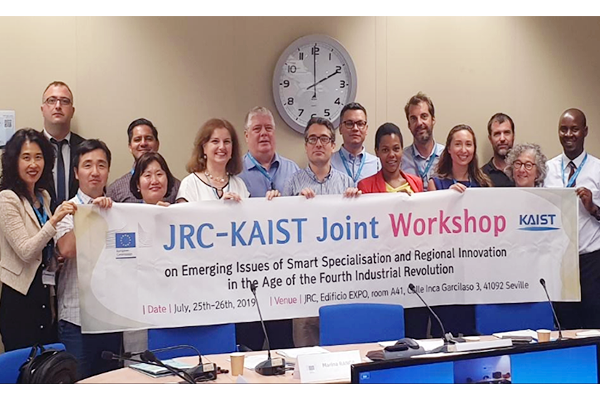
KAIST (President Sung-Chul SHIN) announced that the Fourth Industrial Revolution Intelligence Center (FIRIC), headed by Distinguished Professor Sang Yup LEE, had held a joint workshop with the EU Joint Research Center (EU-JRC) in Seville, Spain from July 25th (Thu) to 26th (Fri).
Founded in 1958, the EU-JRC is headquartered in Brussels, Belgium, and is an organization developing a cohesive policy that aims to narrow regional gaps within the European Union.
Having long been in charge of EU strategies for regional innovation based on emerging technologies, the EU-JRC has recently invited KAIST FIRIC to hold a joint workshop to discuss technologies and policies under the theme of “Smart Specialization” for regional innovation and economic growth in the era of the Fourth Industrial Revolution (4IR).
Dr. Mark Boden, the Team Leader of the EU-JRC, introduced the EU’s initiatives to promote Smart Specialization, such as its policy process, governance design, vision sharing, and priority setting, with particular emphasis on targeted support for Smart Specialization in lagging regions.
Dr. Marina Ranga, the same team’s project coordinator, explained in more detail the role of Smart Specialization, as a catalyst for the development of early-stage regional innovation systems. In addition, her talk emphasized the importance of establishing a knowledge base and learning system to achieve regional innovations, and the collaborations among specialized industries in particular.
The workshop discussion also covered further issues related to public-private partnership and innovation clusters from the perspective of the EU and Asia, such as the global value chain as well as the implementation of industrial cluster policy amid changes in the industrial ecosystem due to digitalization, automation, and utilization of robotics during the Fourth Industrial Revolution.
In addition, the session included discussion on inclusive growth and job market changes in the era of the Fourth Industrial Revolution, addressing how Smart Specialization and the outcomes of the 4IR will shift the paradigm of current job and technology capabilities. Also discussed were employment issues in many relevant industries. In particular, actual case studies and their related policies and regulatory trends regarding potential risks and ethical issues of artificial intelligence were introduced.
Regarding financial services that utilize blockchain technologies and the establishment of public sector governance for such technologies, the participating experts noted difficulties in the diffusion of blockchain-based local currencies or public services, which call for a sophisticated analytical and practical framework to establish innovative and transparent governance.
KAIST’s Fourth Industrial Revolution Intelligence Center was founded in cooperation with the World Economic Forum in July 2017 to carry out policy research for the promotion of science and technology-based inclusive growth and innovation and to lead global efforts therefor.
In the future, KAIST FIRIC and the EU-JRC plan to sign an MOU in order to collaborate more systematically on regional innovation policies in the era of the Fourth Industrial Revolution, including joint research projects.
Professor So Young KIM of the Graduate School of Science and Technology Policy, FIRIC’s Deputy Director commented, “KAIST’s global role regarding the Fourth Industrial Revolution will be expanded in the process of exploring and developing innovative models of technology-policy governance while working jointly with EU-JRC.”


